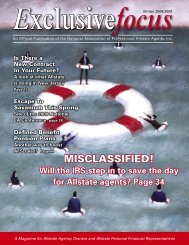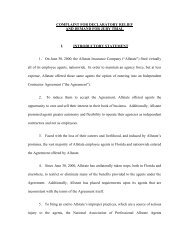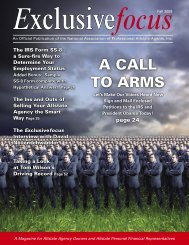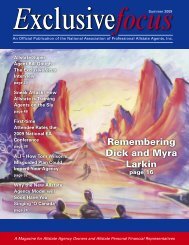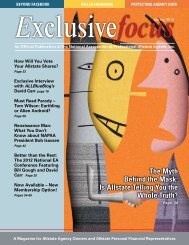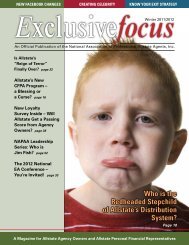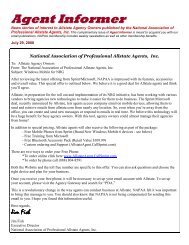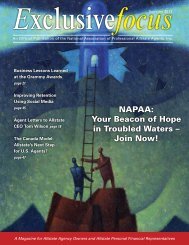Exclusivefocus Summer 2012.pdf - National Association of ...
Exclusivefocus Summer 2012.pdf - National Association of ...
Exclusivefocus Summer 2012.pdf - National Association of ...
Create successful ePaper yourself
Turn your PDF publications into a flip-book with our unique Google optimized e-Paper software.
featureAdjuster Pay StymiedA Field Adjuster’s PerspectiveFor this issue <strong>of</strong> <strong>Exclusivefocus</strong> Ithought I would touch on a few<strong>of</strong> the subjects that are raw pointsfor claims employees. First, there is anew way that the company believes willhelp the company grow – we call it the“Act Like an Owner” concept. Keep inmind that we in the claims departmentare all employees, so acting like an owneris foreign to us. We didn’t come to workat Allstate to become entrepreneurs; wewere hired as employees, who wantedsecure jobs helping Allstate customerswith their claims. Of course, we wantedbenefits too, which is another reason wedidn’t opt to become independent adjusters,most <strong>of</strong> whom are independentcontractors without benefits.The Act Like an Owner program hasseveral things the company wants employeesto do. Before we go any farther,however, you should be aware that thisprogram is tied to our pay. If we can’t accomplishthe items they want us to do, itnegatively affects our pay.Here is the downside <strong>of</strong> the approachto which they have mandated for claims.They want ideas from us, but they arenot interested in them unless it makesthe company lots <strong>of</strong> money and costsnext to nothing to implement. I guessthis is good for pr<strong>of</strong>its, but the employeesget nothing for their ideas except asmall thank you. Also, tying this to anemployee’s pay has created problems becausemanagers are shifting their ownresponsibility for coming up with ideasto lesser claims employees by expectingpeople to volunteer to do the work theyshould be doing. If you don’t participatewith ideas to share, it affects your pay.For one thing, idea sharing counts as50% on your performance review, so ifyou haven’t been a “team player,” its notlikely you’ll get a pay increase.This predicament has prompted somepeople to volunteer to do some <strong>of</strong> theirmanager’s work. When this occurs, theemployee who “volunteers” is not workingon the job they were hired to do. Say,for instance, they are field adjusters, assignedto inspect damage for customers.When they concentrate solely on theirjob, it improves customer satisfactionand retention. But if they are doing littlethings for their manger, they are turningin some assignments unfinished.When they don’t complete the normalwork schedule for the day, it slows thingsdown. The assignment could be set foranother day, delaying the inspection.The assignment could also be given toanother adjuster to handle even thoughhe or she has a full schedule. Either way,it has a negative affect on the customerand other employees.There is no way this should be happening!Upper management in the companyagain has failed to see what is goingon. They think the concept <strong>of</strong> being anowner <strong>of</strong> the company is a good thing.It might be, if it were applied correctly.But it should not be tied to wages nortied to doing extra work for managers.Instead it should be a program that looksfor better ways to enhance the customerexperience. This includes listening andempathizing with them as well as doingyour best to help them. This alone willhelp the company grow. It will also helpthe agents also who work hard trying toget and retain their customers by creatingmore good will in the communitieswhere they do business.Claims management thinks us in terms<strong>of</strong> teams. Everything we do in claims dois measured and compared to others inour peer group, or “team.” Managementestablishes arbitrary numbers that theyexpect us to reach. If you don’t reachthem, it affects your pay. They wanteach <strong>of</strong> us to help others so they willalso achieve good numbers. But, if yourpay is based on peer performance howmuch should we be willing to share? Ifyou share all you know then maybe yourpeers will begin to outperform you. Theperson you helped might now be out performingyou and then your assessmentfor performance pay is adversely affected.I know this sounds crazy but it is howit works. Instead <strong>of</strong> acting as the incentiveit was intended to be, this program ishaving the opposite effect for many <strong>of</strong> us.Another thorn in the side for fieldadjusters is the re-inspection process,which is another way the company controlsyour pay. Here’s how the re-inspectionprocess works: After the adjusterhas completed an assignment it could beassigned to another adjuster who looksat how the estimate was written. There-inspectors scour the original estimatelooking for any and all errors made bythe first adjuster, which is how they justifytheir jobs. They don’t have to answerto the customer or the repair shop, onlyto their boss. They can look at what youdid and make arbitrary calls. Sometimesthey’ll say you paid too much to have thecar repaired and other times they’ll sayyou didn’t pay enough.Here’s the rub. If a re-inspector saysyou paid too much, he doesn’t have to goto the shop and get an agreed price forthe “right” amount. If the first estimateis <strong>of</strong>f and you are overpaid, wouldn’t itmake sense for the re-inspector to try toget the overage back? But as nonsensicalas it sounds, they don’t have to. Thisis why everyone knows the re-inspectionprocess has nothing to do with the estimateor dollar amount; it only has to dowith wage control. Maybe it’s their way<strong>of</strong> keeping the adjusters honest, but it46 — <strong>Exclusivefocus</strong> <strong>Summer</strong> 2012





